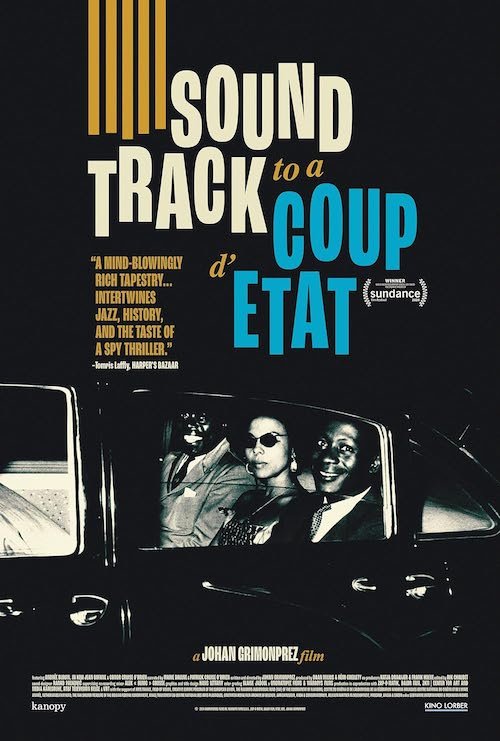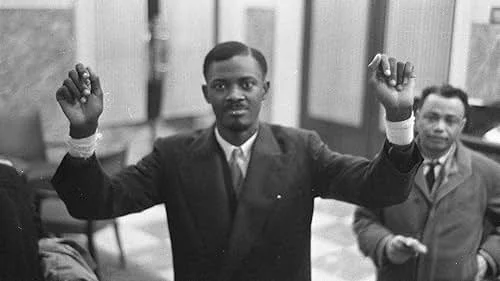Soundtrack to a Coup d'Etat
Written by Andreas Babiolakis
Jazz music is unlike any other form of musical expression. No matter what genre you listen to — from modal and big band to avant-garde and fusion — there is usually a band leader who strings a series of individual instruments (who are really having their own separate conversation with the listener) through a wormhole of shifts, pivots, and convergence. Not only is jazz typically unpredictable (more than any other genre of music, outside of classical compositions, I’d argue), each song never hits you the same way when you revisit it again, no matter when (later on in your life, or right away after your first listen; the statement remains true). Jazz possesses a highly personal connection with its listeners that pushes them to spot the intricacies as much as it encourages them to understand the bigger picture. In other words: if a film was to combine jazz with the chaotic, meandering ways of national politics, the blend works on paper. News spreads rampantly. Opinions flare. We’re often left trying to make sense of it all. The major difference is jazz is enjoyable; the news typically isn’t.
This brings us to Johan Grimonprez’s blistering documentary (and the finest one of 2024 at that), Soundtrack to a Coup d'Etat: a highly complex look at the call for decolonization in the era of the Cold War. It kicks off in 1961, with jazz legends Abbey Lincoln (singer) and Max Roach (drummer), both featured on the latter’s exemplary album We Insist! (one made to represent the Black community and their fight for independence and rights, released in 1960). Lincoln and Roach went one step further a year after this album by crashing the United Nations Security Council out of anger; Congolese Prime Minister Patrice Lumumba was executed by Katangan separatists in response to his influence on encouraging Congo to gain independence away from Belgium’s colonization. Lincoln and Roach wanted reparations for this slaughter, and felt that Lumumba was murdered in cold blood because his fight for decolonization went against the broken system being used at the expense of countless races and cultures for centuries. If anything, it appears the UN allowed Lumumba’s execution to happen without repercussion.
What sets off in Soundtrack to a Coup d'Etat is a chain reaction of sequences, dialing back to multiple shakeups in similar retaliation, including the infamous moment where Soviet politician Nikita Khruschev allegedly banged his shoe on the desk of the United Nations’ General Assembly (while the certainty of this moment is still heavily debated, the idea of sound and percussion playing into political frustration rings true here); this action rang in a similar fashion in the protests at the UNSC as well. Needless to say, a lot goes on in Soundtrack to a Coup d'Etat (it is two and a half hours, after all), but the film lays out all of its information superbly well. Whether you are new to jazz or not fluent in global politics (especially those of yesteryear), Soundtrack to a Coup d'Etat will keep you up to speed.
Soundtrack to a Coup d'Etat is a ferociously paced film that never lets up, nor does it lose sight of its arguments or focus one bit.
Pieced together like a visual version of musique concrète, Soundtrack to a Coup d'Etat is stuffed with found footage, news reels, and countless visual cues that render the film a well-assembled mosaic of information. Unlike some documentaries where this many montages feel like a collection of random bits of intel, Soundtrack to a Coup d'Etat is a wholly homogenized experience. With the huge inclusion of fifties and sixties jazz throughout the film (from well known titans like Louis Armstrong, Nina Simone, Charles Mingus, and John Coltrane, to genre staples that you should know like Eric Dolphy, Miriam Makeba, and Ornette Coleman), Soundtrack to a Coup d'Etat creates tension, anticipation, and a frenzy; in this respect, jazz truly lives up to the title of the film. If you are green when it comes to the genre, Soundtrack to a Coup d'Etat — while this isn’t the intention of the film — is a great starting point for discovering more of jazz’s greats whilst displaying one of the many ways the genre works best (creating a new mindset no other music can).
The blistering snare rolls of a jazz drumming cues in the marching of those who refuse to take it anymore. Jazz scatting becomes the tabula rasa chants of the silenced finally being heard. The polyrhythms and tonal shifts of jazz compositions feel like rebellious restructuring: sidesteps and turns to get away from opposing forces. Despite its runtime, Soundtrack to a Coup d'Etat zips by you, kicking off at super speed from the jump and never easing up on the gas pedal. Strangely, even though the film runs at the speed of lightning and delivers so much information to digest, nothing ever gets lost in translation. Like the best jazz songs, much is happening at a calamitous pace, and yet you are able to pick out each and every part, retain every fact, and feel every intended statement. This is a dynamic documentary: one that you learn from, and one that you feel. It is a depiction of those who demanded to be heard once and for all, and Soundtrack to a Coup d'Etat, similarly, is a film you cannot ignore as an artistic achievement or a political, historical analysis.
Andreas Babiolakis has a Masters degree in Film and Photography Preservation and Collections Management from Ryerson University, as well as a Bachelors degree in Cinema Studies from York University. His favourite times of year are the Criterion Collection flash sales and the annual Toronto International Film Festival.







